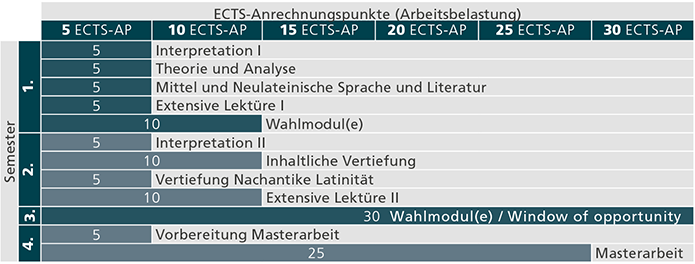Masterstudium Klassische Philologie – Latein
Curriculum (2018W)
Ab dem Wintersemester 2022/2023 darf eine Zulassung zu diesem Studium nur nach dem neuen Curriculum erfolgen. Das nachfolgende Masterstudium finden Sie hier »
Master of Arts (MA)
Dauer/ECTS-AP
4 Semester/120 ECTS-AP
Studienart
Vollzeit
Unterrichtssprache
Deutsch
Voraussetzung
Matura/Äquivalentes Zeugnis und Sprachnachweis
Fakultät
Philologisch-Kulturwissenschaftliche Fakultät
Niveau der Qualifikation
Master (2. Studienzyklus) ISCED-11: Stufe 7, EQR/NQR: Stufe 7
ISCED-F
0231 Spracherwerb
Studienkennzahl
UC 066 837
*Informationen zum Curriculum (2018W)
Die Gesamtfassung des Curriculums spiegelt das aktuell gültige Curriculum wider, ist rechtlich unverbindlich und dient lediglich der Information. Die rechtlich verbindliche Form des Curriculums inkl. etwaiger Änderungen finden Sie in den entsprechenden Mitteilungsblättern.
Die Information, welche Curriculumsversion für Sie gilt, entnehmen Sie bitte Ihrem Studienblatt
abrufbar unter: https://lfuonline.uibk.ac.at/public/lfuonline_meinestudien.studienblatt
Spalte: Curriculum in der geltenden Fassung
- Mitteilungsblatt vom 15.06.2022, 54. Stück, Nr. 574 - PDF (Auflassung ordentlicher Studien)
- Mitteilungsblatt vom 05.05.2021, 62. Stück, Nr. 705 (Berichtigung des Curriculums)
- Curriculum/Gesamtfassung (ab 01.10.2019)
- Mitteilungsblatt vom 28.06.2019, 67. Stück, Nr. 602 (Änderung des Curriculums)
- Mitteilungsblatt vom 13.07.2018, 58. Stück, Nr. 542 (Ergänzungen)
- Mitteilungsblatt vom 11.04.2018, 23. Stück, Nr. 291
Voraussetzung
Fachlich infrage kommendes Bachelorstudium an der Universität Innsbruck:
- Bachelorstudium Classica et Orientalia (2009W)
- Bachelorstudium Classica et Orientalia (2015W)
Kriterien zur Feststellung der Gleichwertigkeit:
Auch bei Abschluss eines anderen fachlich infrage kommenden Bachelorstudiums ist die Zulassung zu diesem Masterstudium möglich. Im Rahmen der Feststellung der Gleichwertigkeit wird jedenfalls die Absolvierung folgender Kernbereiche im Rahmen des abgeschlossenen Bachelorstudiums geprüft:
- 10 ECTS-AP aus dem Kernbereich Lateinische Sprache
- 15 ECTS-AP aus dem Kernbereich Antike Literatur
- 7,5 ECTS-AP aus dem Kernbereich Kulturgeschichte der Antike
- 7,5 ECTS-AP aus dem Kernbereich Grundlagen und Methoden der Klassischen Philologie
Sollten auf die Herstellung der Gleichwertigkeit nur einzelne Ergänzungen (maximal 30 ECTS-AP) fehlen, kann die Zulassung mit der Auflage von Prüfungen, die im Rahmen des Masterstudiums zu absolvieren sind, verbunden werden.
Empfohlener Studienverlauf
Der unten angeführte, exemplarische Studienverlauf gilt als Empfehlung für Vollzeitstudierende, die das Studium im Wintersemester beginnen. Die Aufstellung dient der Darstellung eines möglichen Studienablaufs und ist nicht verpflichtend. Etwaige Prüfungswiederholungen bzw. deren studienzeitverzögernde Wirkung sind nicht berücksichtigt.
Die Regelstudienzeit beträgt 4 Semester bzw. 120 ECTS-AP, wobei gemäß Universitätsgesetz die Arbeitsbelastung eines Studienjahres 1.500 (Echt-)Stunden zu betragen hat und dieser Arbeitsbelastung 60 Anrechnungspunkte zugeteilt werden (ein ECTS-Anrechnungspunkt entspricht einer Arbeitsbelastung der Studierenden von 25 Stunden).
5,0 ECTS-AP: Interpretation I
5,0 ECTS-AP: Theorie und Analyse
5,0 ECTS-AP: Mittel und Neulateinische Sprache und Literatur
5,0 ECTS-AP: Extensive Lektüre I
10,0 ECTS-AP: Wahlmodul(e)
5,0 ECTS-AP: Interpretation II
10,0 ECTS-AP: Inhaltliche Vertiefung
5,0 ECTS-AP: Vertiefung Nachantike Latinität
10,0 ECTS-AP: Extensive Lektüre II
30,0 ECTS-AP: Wahlmodul(e) / Window of opportunity
5,0 ECTS-AP: Vorbereitung Masterarbeit
25,0 ECTS-AP: Masterarbeit

| Semester | ECTS-AP | Titel |
|---|---|---|
Erweiterung des Studiums
Im Rahmen dieses Studiums kann das Erweiterungsstudium Entrepreneurship im Umfang von 45 ECTS-AP absolviert werden. Die Zulassung zur Erweiterung setzt die Zulassung zu einem oder den bereits erfolgten Abschluss eines ausgewählten Studiums voraus. Weitere Informationen sind abrufbar unter:
Wahlpaket
Im Rahmen des Masterstudiums kann eine Wahlpaket im Umfang von 30 ECTS-AP absolviert werden.
Weiterführende Informationen bzw. eine Liste möglicher Wahlpakete sind abrufbar unter:
https://www.uibk.ac.at/studium/angebot/wahlpakete/
Informationen zur Prüfungsordnung inkl. Bewertung und Benotung
Prüfungsordnung
Die Prüfungsordnung ist integraler Bestandteil des Curriculums, detaillierte Informationen finden Sie unter dem Paragrafen Prüfungsordnung.
Bei der Notenverteilungsskala handelt es sich um die statistische Darstellung der Verteilung aller positiv absolvierten Prüfungen, die innerhalb eines Studiums bzw. eines Studienfaches (unter Heranziehung aller gemeldeten Studierenden eines Studiums bzw. eines Studienfaches) erfasst wurden. Die Notenverteilungsskala wird in regelmäßigen Abständen aktualisiert.
| A | B | C | D | E |
|---|---|---|---|---|
| Österreichische Notenskala | Definition | %-Satz | ||
| 1 | SEHR GUT: Hervorragende Leistung | 63,0 | = 100% | |
| 2 | GUT: Generell gut, einige Fehler | 14,8 | ||
| 3 | BEFRIEDIGEND: Ausgewogen, Zahl entscheidender Fehler | 12,3 | ||
| 4 | GENÜGEND: Leistung entspricht den Minimalkriterien | 9,9 | ||
| 5 | NICHT GENÜGEND: Erhebliche Verbesserungen erforderlich, Erfordernis weiterer Arbeit |
Dezember 2020
Gesamtbeurteilung der Qualifikation
Nicht zutreffend
Erklärung: Eine Gesamtbeurteilung (mit Auszeichnung bestanden, bestanden, nicht bestanden) wird nur über eine studienabschließende Prüfung, die aus mehr als einem Fach besteht, vergeben (im Curriculum dieses Studiums ist diese nicht vorgesehen).
Formulare
- Prüfungsprotokoll
- Anmeldung der Masterarbeit
- Beurteilung des Pflichtmoduls: Vorbereitung Masterarbeit
- Deckblatt der Masterarbeit
- Eidesstattliche Erklärung (der Masterarbeit beifügen)
- Einreichung der Masterarbeit
- Sperre der Masterarbeit
- Ansuchen um Anerkennung von Prüfungen UND Beiblatt
- Antrag um Zulassung zur dritten und vierten Wiederholung einer Lehrveranstaltungsprüfung
Kontakt und Information
Prüfungsreferat
Standort Innrain 52d
Studienbeauftragter
Univ.-Prof. Dr. Martin Sexl
Studiendekanin (ab 01.03.2024)
Mag. Dr. Elisabeth De Felip-Jaud
